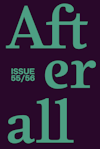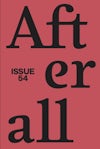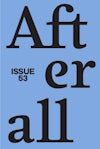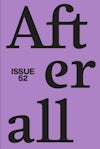
Issue 4
Autumn/Winter 2001
Editors: Charles Esche, Mark Lewis, Silke Otto-Knapp.
Founding editors: Charles Esche, Mark Lewis.
Table of contents
Foreword
Contextual Essays
- On the Saying that Philosophy Begins in Thaumazein – John Llewelyn
- Mutatis Mutandis. Curating in the Millennium – Warren Niesluchowski
Artists
Jack Goldstein
- Figuring Difference: The Work of Jack Goldstein – Jean Fisher & Stella Santacatterina
- Managing Fascination: Jack Goldstein, Hollywood and the Desire for Control – Tom Holert
- Moderato Cantabile – Mark Cousins & Cerith Wyn Evans
Frances Stark
- The Housewife in Public – Martin Prinzhorn & Frances Stark
Frances Stark
- All Things to All People – Frances Stark
Thomas Struth
- Lost Paradises – Ingo Hartmann
- Wondering About Struth – Shepherd Steiner
Lily van der Stokker
- We Have Gotten Through Difficult Times or, Female Trouble: Brightening the Corners since 1990 – Robert Nickas
- How Much Nerve Does It Take to Stand Up for ‘Feminine Stupidity’? – Mirjam Westen
- As Pink as Possible – Charles Esche & John Waters
Cerith Wyn Evans
- Style and Council: Cerith Wyn Evans and the Devastation of Meaning – Liam Gillick & Cerith Wyn Evans
- This Evening, Cerith – Andreas Spiegl & Cerith Wyn Evans
Foreword
Written by Charles Esche
The latest issue of Afterall introduces a new design and marks the beginning of a more expansive ambition for the journal…
The latest issue of Afterall introduces a new design and marks the beginning of a more expansive ambition for the journal. When we began in 1999, we determined to commit ourselves to detailed analyses and discussions on the work of individual artists, whilst also attempting to place the implications of their investigations into an appropriately wide frame of social, philosophical and political developments. We sought to demonstrate our belief that the work of artists touches upon vital questions concerning our way of life and values in this slippery period at the turn of the century. After two years and four issues, we feel it is necessary to reassess our policies and see if they still hold good. Above all, the commitment to individual, or collective but singular practice seems essential to maintain. This is because, in a world of specialisation, the uniquely permissive license granted the artist to stray into diverse areas of knowledge and report back to a wider public is ever more valuable. We have to ensure both that the balance between the individual and the social is constantly adjusted and that the affinities between the artists illuminate their individual practice without closing down ways of seeing and interpreting it. Allowing writers to stray from straightforward analysis, to go off the point, or develop allusive, tangential writings in relation to the artists’ work is a, perhaps contradictory, ambition that we would like to reinforce. Increasingly, we also feel that there is more room for a broader sweep of ideas to be covered in the journal and under the Afterall imprint. Art is a generator of new possibilities and ways of thinking about the world but, simultaneously, it is a great consumer of intelligence discovered in other areas. Bringing these two elements together – research by artists and research that might inform art – will be a new point of departure for the journal.
Over the next year we will introduce an Afterall Books imprint in which people working in different fields and cultural activities can discuss research topics. Likely topics for the future include art and capitalism and the shape of cultural politics after 1989.
Purchase
The publication is available for purchase. If you would like specific articles only, it is also available individually and to be downloaded as PDFs.
Purchase full publication
Buy via University of Chicago Press
Buy via Central Books
Purchase individual articles
Buy via University of Chicago Press



